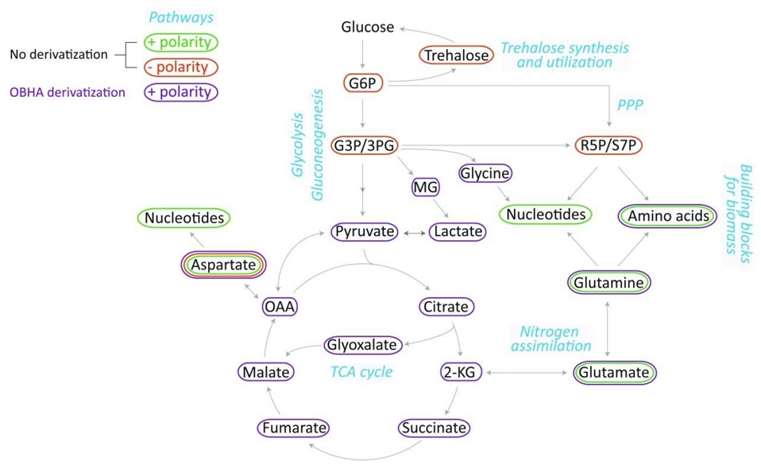Metabolic flux analysis (MFA) is a widely used and powerful tool for the quantitative analysis of microbial and mammalian metabolism and has a wide range of applications in metabolic engineering, fermentation engineering, pathology research, and systems microbiology. In addition to the choice of stable isotope tracers, the selection of an informative isotope labeling measurement method is another major factor affecting the accuracy of MFA flux estimation. Creative Proteomics offers liquid chromatography-mass spectrometry (LC-MS) and liquid chromatography with tandem mass spectrometry (LC-MS/MS)-based metabolic flux analysis services for a variety of metabolisms.
 Fig. 1 Metabolites and pathways covered in the presented LC-MS/MS methods.
(Walvekar, Adhish, et al , 2018)
Fig. 1 Metabolites and pathways covered in the presented LC-MS/MS methods.
(Walvekar, Adhish, et al , 2018)
Overview of LC-MS in metabolic flux studies
When certain metabolites are incompatible with GC-MS analysis or require derivatization, in which case LC-MS is the method of choice. Compared to GC-MS, the electrospray ionization used in LC-MS is a soft ionization technique that reduces source fragmentation. Soft ionization provides additional information on the m/z of primary ions with a low internal energy that can be subjected to further fragmentation, which is usually achieved by triple quadrupole or ion trap instruments. Therefore, LC-MS, with its softer ionization and higher sensitivity, is usually applied to measure metabolic intermediates that are less stable and less abundant than proteinogenic amino acids in the cell.
| Comparison of GC-MS and LC-MS in metabolic flux studies | |
|---|---|
| GC-MS | LC-MS |
| Sample derivatization required | No sample derivatization is required |
| Lower sensitivity | Higher sensitivity |
| Mainly used to determine the mass isotope distributions (MIDs)of proteinogenic amino acids | Typically used to measure metabolic intermediates |
| MS is a destructive technique; therefore, the sample cannot be recovered | |
| Not suitable for in vivo metabolic flux analysis | |
| MS data are less reproducible compared to NMR spectroscopy | |
| Needs only a small amount of sample | |
| More targeted analyses | |
Service offering
With advanced instrumentation and data analysis software, Creative Proteomics has developed robust LC-MS/ LC-MS/MS-based metabolic flux analysis platforms. As a highly sensitive and specific technique, LC-MS/MS allows the detection of molecules in the femtomolar range. Based on this method, a very small amount of biomass is required for the analysis, allowing very small cultivation volumes in the microliter range. Our experts with years of experience in metabolomics, bioinformatics, statistics and various application areas ranging from metabolic engineering to biomedical applications can help you plan, conduct, and report your metabolic flux studies.
Workflow of our service

Sample requirement
- We accept a wide range of biological materials including, but not limited to, cells, tissues, organs, and biofluids
- For specific sample requests, please contact us
Available metabolic flux analysis
- Glycolytic pathway (EMP) metabolic flux analysis
- Tricarboxylic acid cycle pathway (TCA) metabolic flux analysis
- Pentose phosphate pathway (PPP) metabolic flux analysis
- Amino acid metabolic flux analysis
- Fatty Acid Metabolism metabolic flux analysis
- One-Carbon Metabolic flux analysis
- Nucleotide metabolic flux analysis
- NADPH energy metabolic pathway metabolic flux analysis
Advantages of our services
- GC-MS and LC-MS are highly complementary detection platforms
- 13 C and 15 N tracers covering hundreds of species of multi-channel labeled metabolites
- Adherent cell and suspension cell harvest protocol for metabolic flux analysis
- Customized metabolic flux analysis and result interpretation integration service
Creative Proteomics is a leading provider of metabolic flux analysis services. We are dedicated to providing accurate and complete analysis reports including method interpretation, experimental parameters, data, and results analysis that can be adapted to a wide range of innovative research projects. If you are interested in metabolic flux, you can obtain further knowledge or consulting services from our professional experts. Contact us and someone from our team will be in touch shortly.
References
- de Falco, Bruna, et al . "Metabolic flux analysis: a comprehensive review on sample preparation, analytical techniques, data analysis, computational modelling, and main application areas." RSC advances 12.39 (2022): 25528-25548.
- Walvekar, Adhish, et al. "A versatile LC-MS/MS approach for comprehensive, quantitative analysis of central metabolic pathways." Wellcome Open Research 3.122 (2018): 122.